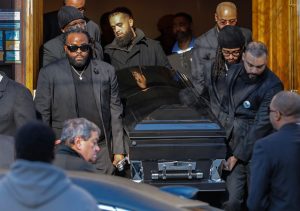
‘Missing baby problem’: More parents accuse Brigham and Women’s of losing fetal remains in baby Everleigh case
Brigham and Women’s Hospital has now been accused of five cases of improperly disposing of the fetal remains, lawyers stated in a hearing in Suffolk Superior Court.
“The plaintiffs, despite the best efforts of Brigham and Women’s Hospital, have discovered that this is not an isolated incident,” said Patrick Driscoll, lawyer for the plaintiffs, at the hearing. “There are actually five effected families, where their child’s remains were discarded in a 17-month period starting in August of 2020 against their wishes.”
The hearing, presided over by Judge Michael Doolin, stemmed from a lawsuit brought by the parents of baby Everleigh, a 12-day old newborn who died at Brigham and Women’s in Aug. 6, 2020.
When a funeral home employee went to collect Everleigh’s body days after her death, according to court documents, morgue staff was unable to located her remains. On Aug. 12, hospital investigators found via video and interviews that a pathologist had likely discarded the baby’s body while throwing away linens. Everleigh’s remains were never located.
Her parents, Alanna Ross and Daniel McCarthy, filed a lawsuit against Brigham and Women’s, Mass General Brigham and a long list of hospital employees alleging improper handing and disposal of their child’s remain.
In Thursday’s hearing, the plaintiffs moved to compel the hospital to hand over documents and request the judge overrule the hospital’s medical privilege-based objections. These moves, the plaintiffs’ lawyers said, would uncover evidence related to four other cases of improper disposal of fetal remains and hospital staff’s knowledge of issues in the morgue.
Brigham and Women’s attorney Allyson Hammerstedt argued Thursday the four new cases were “distinguishable” from the original case.
“Those cases that we are aware of at this point involve voluntary induction termination procedures under 24 weeks, so abortion procedures,” Hammerstedt said. “In those cases, in order for disposition to happen within the hospital pursuant to hospital policy, a signed release has to happen by the patient, indicating instructions for disposal.”
The hospital is not aware of any of these cases, raised in the lawsuit or otherwise, the defendants’ attorney said, in which there was not a signed release.
The hospital has also properly complied with all orders to hand over evidence, Hammerstedt argued, a point which the sides went back and forth over at the hearing.
Defendants’ attorneys declined to comment following the hearing.
Letters submitted in the case documents outline three stories of the other families who never received their children’s remains from the hospital since the baby Everleigh case was brought. Each describe parents’ emotional decisions to abort pregnancies based on medical complications, conflicting or unclear messaging from the hospital, and acknowledged errors regarding the disposal of the remains of their children — identified as Oliver, Katherine and Kaylee.
“Regardless of what the judge decides here, there’s four other families that need to have accountability,” said lawyer for the plaintiffs Gregory Henning. “There’s four other families that need answers about what happened to their children.”


